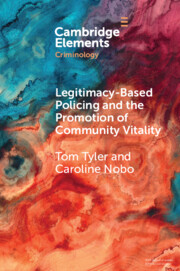Legitimacy-Based Policing and the Promotion of Community Vitality
This Element presents the history, research, and future potential for an alternative and effective model of policing called 'legitimacy-based policing'. This model is driven by social psychology theory and informed by research findings showing that legitimacy of the police shapes public acceptance of police decisions, willingness to cooperate with the police, and citizen engagement in communities. Police legitimacy is found to be strongly tied to the level of fairness exercised by police authority, i.e. to procedural justice. Taken together these two ideas create an alternative framework for policing that relies upon the policed community's willing acceptance of and cooperation with the law. Studies show that this framework is as effective in lowering crime as the traditional carceral paradigm, an approach that relies on the threat or use of force to motivate compliance. It is also more effective in motivating willing cooperation and in encouraging people to engage in their communities in ways that promote social, economic and political development. We demonstrate that adopting this model benefits police departments and police officers as well as promoting community vitality. This title is also available as Open Access on Cambridge Core.
Product details
January 2023Paperback
9781009308045
75 pages
229 × 151 × 5 mm
0.14kg
Available
Table of Contents
- 1. Introduction
- 2. The coercive model
- 3. Psychological models of authority
- 4. Legitimacy-based policing
- 5. Expanding the goals of policing
- 6. Expanding participation when identifying community problems and solutions
- 7. Conclusion.





